Several Aboriginal activists yesterday condemned remarks President Ma Ying-jeou (馬英九) made on Wednesday, when he said that complete autonomy for Aborigines would only bring isolation, and that Aborigines should be valued for their talent in sports and music.
“We Aborigines cannot agree at all with the discriminatory remarks that Ma made against the country’s Aborigines during a Chinese Nationalist Party [KMT] Central Standing Committee meeting on Wednesday,” Indigenous Peoples’ Action Coalition of Taiwan (IPACT) convener Omi Wilang told a news conference in Taipei. “We strongly condemn the remarks. He should apologize for them.”
Other activists at the press conference supported Omi’s call, and shouted in unison for Ma to apologize.

Photo: Lo Pei-der, Taipei Times
“This is not the first time that Ma has made discriminatory remarks against Aborigines,” Assembly of the Atayal Nation -secretary-general Utux Lbak said. “As it becomes a universal value around the world to respect indigenous peoples’ rights to the land and autonomy, the president is falling far behind the global trend.”
The activists were “livid” because Ma, in his capacity as KMT chairman, told the KMT Central Standing Committee meeting that “ceding territories” to Aborigines to create autonomous regions is not what was best for Aborigines, since it could isolate them.
He also said the public should value the talents of Aborigines more, such as in sports or in music, and that Aborigines may need “some degree of protection.”
“How is [the government] ‘ceding territories’ if autonomous regions are created? Aboriginal traditional domains are all our territories, it’s the several foreign regimes [that ruled Taiwan over the course of history] that took our lands,” Utux said. “We’re not asking [the government] to cede territories, we are only asking for our basic rights.”
Former Examination Yuan member Iban Nokan, on the other hand, criticized the Aboriginal autonomy bill drafted by the Executive Yuan, which incorporated Ma’s ideas about Aboriginal autonomy.
“The Executive Yuan’s draft autonomy bill is more about creating Aboriginal cultural preservation areas under current local government systems than creating authentic autonomous regions,” Iban said. “We Aborigines want our own autonomy, not Han people’s version of Aboriginal autonomy.”
As long as Ma does not change his Han-centric and Han supremacist mentality, “I don’t have any expectations for the Executive Yuan’s version of the autonomy bill,” he said.
However, KMT Legislator Liao Kuo-tung (廖國棟) of the Amis tribe, who is also a member of the KMT’s Central Standing Committee, defended Ma’s remarks and the government’s version of Aboriginal autonomy.
“Ma was elaborating on his Aboriginal policies and he was very sincere about implementing autonomy, as he promised during the presidential campaign [in 2008],” Liao said, adding that there was no need to pay so much attention to Ma’s choice of words.
Liao said he supports Ma’s idea of implementing autonomy on a trial basis in the initial stage.
“If you try to pour too much stuff into the autonomy bill, it will become chaotic,” he said. “I think it’s a better idea to have a basic framework first, and then amend the law as necessary later on.”

CHAOS: Iranians took to the streets playing celebratory music after reports of Khamenei’s death on Saturday, while mourners also gathered in Tehran yesterday Iranian Supreme Leader Ayatollah Ali Khamenei was killed in a major attack on Iran launched by Israel and the US, throwing the future of the Islamic republic into doubt and raising the risk of regional instability. Iranian state television and the state-run IRNA news agency announced the 86-year-old’s death early yesterday. US President Donald Trump said it gave Iranians their “greatest chance” to “take back” their country. The announcements came after a joint US and Israeli aerial bombardment that targeted Iranian military and governmental sites. Trump said the “heavy and pinpoint bombing” would continue through the week or as long

TRUST: The KMT said it respected the US’ timing and considerations, and hoped it would continue to honor its commitments to helping Taiwan bolster its defenses and deterrence US President Donald Trump is delaying a multibillion-dollar arms sale to Taiwan to ensure his visit to Beijing is successful, a New York Times report said. The weapons sales package has stalled in the US Department of State, the report said, citing US officials it did not identify. The White House has told agencies not to push forward ahead of Trump’s meeting with Chinese President Xi Jinping (習近平), it said. The two last month held a phone call to discuss trade and geopolitical flashpoints ahead of the summit. Xi raised the Taiwan issue and urged the US to handle arms sales to

BIG SPENDERS: Foreign investors bought the most Taiwan equities since 2005, signaling confidence that an AI boom would continue to benefit chipmakers Taiwan Semiconductor Manufacturing Co’s (TSMC, 台積電) market capitalization swelled to US$2 trillion for the first time following a 4.25 percent rally in its American depositary receipts (ADR) overnight, putting the world’s biggest contract chipmaker sixth on the list of the world’s biggest companies by market capitalization, just behind Amazon.com Inc. The site CompaniesMarketcap.com ranked TSMC ahead of Saudi Aramco and Meta Platforms Inc. The Taiwanese company’s ADRs on Tuesday surged to US$385.75 on the New York Stock Exchange, as strong demand for artificial intelligence (AI) applications led to chip supply constraints and boost revenue growth to record-breaking levels. Each TSMC ADR represents

State-run CPC Corp, Taiwan (CPC, 台灣中油) yesterday said that it had confirmed on Saturday night with its liquefied natural gas (LNG) and crude oil suppliers that shipments are proceeding as scheduled and that domestic supplies remain unaffected. The CPC yesterday announced the gasoline and diesel prices will rise by NT$0.2 and NT$0.4 per liter, respectively, starting Monday, citing Middle East tensions and blizzards in the eastern United States. CPC also iterated it has been reducing the proportion of crude oil imports from the Middle East and diversifying its supply sources in the past few years in response to geopolitical risks, expanding